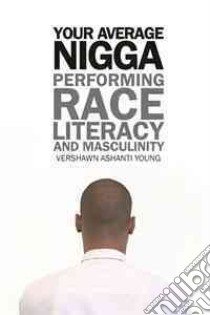Your Average Nigga - 9780814332481
Un libro in lingua di Young Vershawn Ashanti edito da Wayne State Univ Pr, 2007
- € 25.30
- Il prezzo è variabile in funzione del cambio della valuta d’origine
In Your Average Nigga, Vershawn Ashanti Young disputes the belief that speaking Standard English and giving up Black English Vernacular helps black students succeed academically. Young argues that this assumption not only exaggerates the differences between two compatible varieties of English but forces black males to choose between an education and their masculinity, by choosing to act either white or black. As one would expect from a scholar who is subject to the very circumstances he studies, Young shares his own experiences as he exposes the factors that make black racial identity irreconcilable with literacy for blacks, especially black males.
Drawing on a range of interdisciplinary scholarship in performance theory and African American literary and cultural studies, Young shows that the linguistic conflict that exists between black and white language styles harms black students from the inner city the most. If these students choose to speak Standard English they risk alienating themselves from their families and communities, and if they choose to retain their customary speech and behavior they may isolate themselves from mainstream society. Young argues that this conflict leaves blacks in the impossible position of either trying to be white or forever struggling to prove that they are black enough. For men, this also becomes an endless struggle to prove that they are masculine enough. Young calls this constant effort to display proper masculine and racial identity the burden of racial performance.
Ultimately, Young argues that racial and verbal performances are a burden because they cannot reduce the causes or effects of racism, nor can they denaturalize supposedly fixed identity categories, as many theorists contend. On the contrary, racial and verbal performances only reinscribe the essentialism that they are believed to subvert. Scholars and teachers of rhetoric, performance studies, and African American studies will enjoy this insightful volume.
Informazioni bibliografiche
- Titolo del Libro in lingua: Your Average Nigga
- Sottotitolo: Performing Race, Literacy, and Masculinity
- Lingua: English
- Autore: Young Vershawn Ashanti
- Editore: Wayne State Univ Pr
- Collana: (Paperback)
- Data di Pubblicazione: 30 Gennaio '07
- Genere: SOCIAL SCIENCE
- Argomenti : African American men Social conditions African Americans Race identity Race awareness United States
- Pagine: 170
- Dimensioni mm: 222 x 152 x 12
- ISBN-10: 081433248X
- EAN-13: 9780814332481


